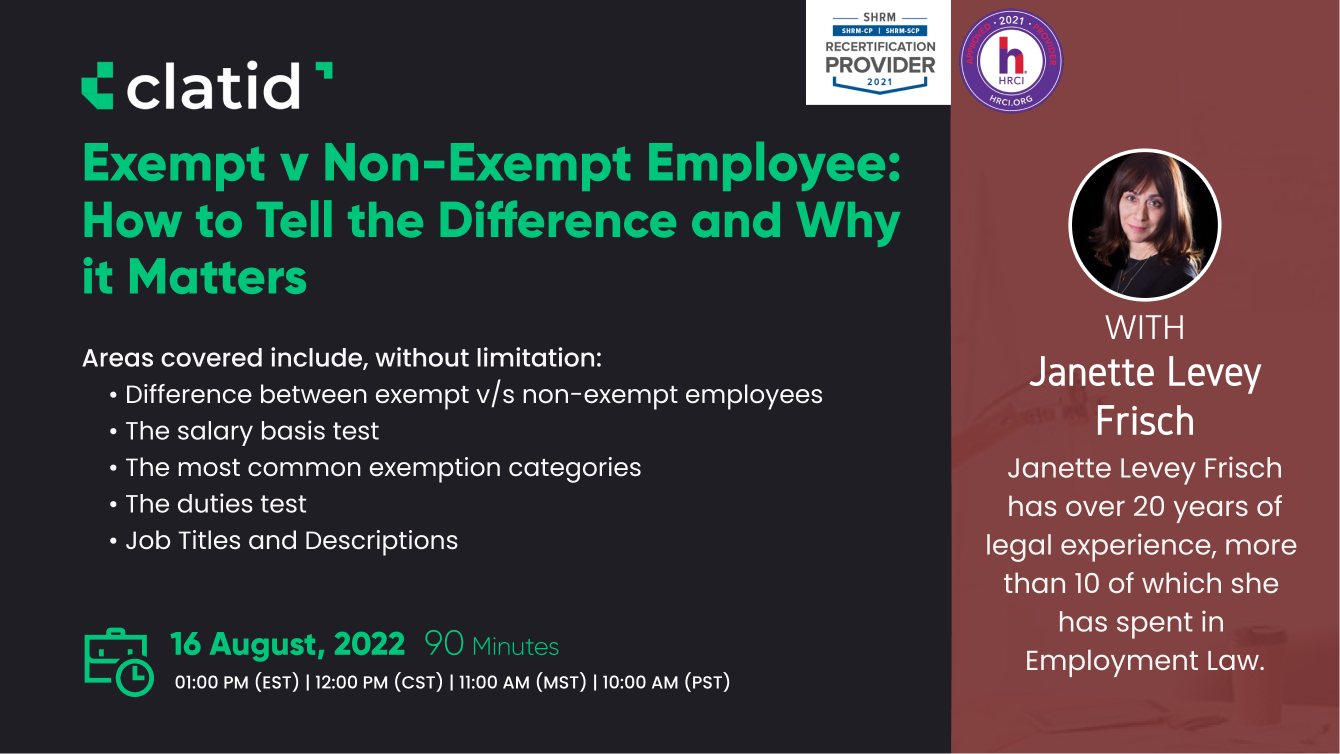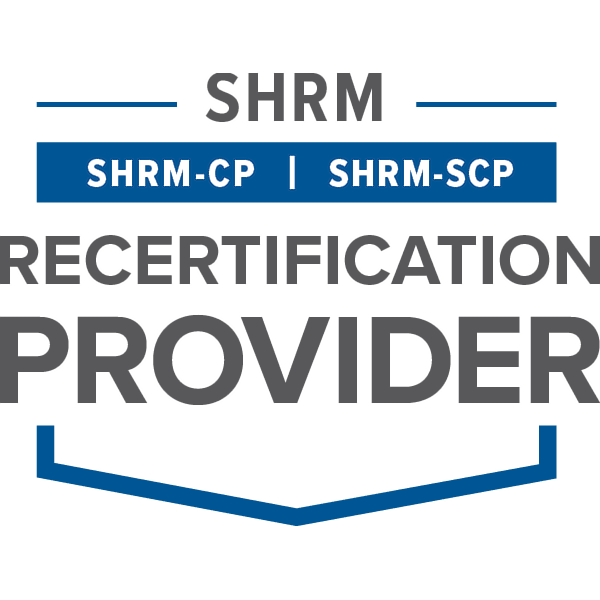- Topics
- Webinars
- Products & Services
- Customer Help
- Resources



During the last decade or two, employers have found it increasingly difficult to decide which employees are entitled to overtime and which are not. Those classifications are commonly referred to as exempt employees and non-exempt employees. The FLSA contains dozens of exemptions, which basically provide that specific categories of employers and employees aren’t subject to the Act’s overtime requirements. Most common are the “white-collar” exemptions for executive, administrative, and professional employees, computer professionals, and outside sales employees.
What are these exemptions exactly? Who qualifies? What must you do to make sure that your employees are properly classified, and, most importantly how can you make sure that your practices comply with the Fair LaborStandards Act (FLSA) so you do not fall prey to a Department of Labor audit – or worse, a lawsuit—resulting in unpaid overtime, liquidated damages, other fines and penalties in addition to your legal fees? Join this webinar and find out!
Areas covered include, without limitation:
-Difference between exempt v/s non-exempt employees
-The salary basis test
-The most common exemption categories
-The duties test
-Job Titles and Descriptions
-Job Evaluations, Supervisor and Employee Interviews
-Discretion
-Supervision
-Authority
-Case examples: Pharma sales reps; Auto service rep’s;
-Financial services employees
-The New Overtime Rules applicable
If you misclassify an employee as exempt from minimum wage and overtime requirements, you are likely underpaying them. The US (and State) Dept. of Labor call that wage theft and acts upon it accordingly. If an employee is actually entitled to overtime pay, you could be on the hook, not only for the overtime pay (and regular pay) but also for liquidated damages in the same amount. In other words, take the amount you owe in unpaid wages and double it. You would also be liable for the employees’ attorney fees – plus your own.
In a class-action lawsuit (i.e. a lawsuit usually involving a group of employees) those amounts increase exponentially. For those employees working in states with more stringent protections, the liquidated damages, and the minimum wage can be higher than those under the Federal Fair Labors Standards Act (FLSA). Yikes!
But it doesn’t have to be that way. Learning how to properly classify (or, if applicable re- classify) your employees will help you avoid such results. You can learn how, by attending this webinar where the expert speaker Janette L. Frisch – an employment Attorney, takes you through the ins-&-outs of the exempt & non-exempt classification and how to classify-reclassify your employees and save yourself from hectic lawsuits.
-Business owners
-CEO’s
-CFO’s
-Controllers
-Compensation Officers
-Payroll Administrators,
-Human Resources Practitioners at all levels,
-Senior Managers

Janette Levey Frisch has over 20 years of legal experience, more than 10 of which she has spent in Employment Law. It was during her tenure as sole in-house counsel for a mid-size staffing company headquartered in Central New Jersey, with operations all over the continental US, that she truly developed her passion for Employment Law.
Janette operates under this core belief: It is possible, and it is in an employer’s best interest, to proactively solve workforce challenges before they become problems before they result in lawsuits or steep fines caused by government audits.
Janette works with employers on most employment law issues, acting as the Employer’s Legal Wellness Professional — to ensure that employers are in the best position possible to avoid litigation, audits, employee relations problems, and the attendant, often exorbitant costs. Janette authors the firm’s weekly blog, where you can read each week, in plain English (not legalese) about issues impacting employers today. Janette has written articles on many different employment law issues for many publications, including EEO Insight, B-Tank, Staffing Industry Review, @Law, and Chief Legal Officer.
Janette is a member of the Workplace Violence Prevention Institute, a multidisciplinary task force dedicated to providing proactive, holistic solutions to employers serious about promoting workplace safety and preventing workplace violence.
Janette has also spoken and trained on topics, such as Criminal Background Checks in the Hiring Process, Joint Employment, Severance Arrangements, Pre-Employment Screening among many, many others.
Clatid is recognized by SHRM to offer Professional Development Credits (PDCs) for the SHRM-CPSM or SHRM-SCPSM. This program is valid for 1.5 PDCs for the SHRM-CPSM or SHRM-SCPSM. For more information about certification or recertification, please portal.shrm.org.
Clatid Webinar Certification - Clatid rewards you with Clatid Achievement Certification for unlocking and attending this webinar. It is to acknowledge your participation in this training session and to add more to your professional score.
Clatid Courses and Webinar or any Education published "Articles & Materials" strictly follows the standards and guidelines of the Professional Credit / CEU Providers and Well Researched before publishment.
Clatid doesn't support any Fake - News, Articles, or Compliance updates; Our Industry Experts are highly verified and recognized, and their Pre-publishment is verified via our experts and fact-checkers.
Sign up now on clatid.io. Visit clatid.io/webinar to discover a wide range of webinars from industry specialists. Tick on either ‘live webinar’ or ‘on-demand’, and simply click on ‘buy now’ to get enrolled.
You can refer Clatid to anyone in your social circle. Explore your industry with your colleagues by getting them signed up on clatid.io today!
Go for the topic of your keen interest on clatid.io. Tick on ‘live webinar’ and get enrolled! Easy registration, transparent transaction.
You can request for an on-demand webinar that records the live webinar for you. After the webinar ends, you will have full access to the webinar’s recording. You can also explore Clatid offline to order your webinar DVDs, flash drives and transcripts.
If you can’t attend the live webinar, simply go for the ‘on-demand webinar’ for the same price! Now, the live webinar recording will be saved in a cloud storage for you to access anytime from anywhere.
Clatid offers both hard and soft copies of the webinars. It contains all the highlights as well as comprehensive descriptions of the webinar, so you never miss out a single detail.
After attending the live webinar, your certificate will be emailed to you. You can download it and add more charm to your professional score.
At the end of each webinar, you have the opportunity to interact with your industry experts, where you will get answers to all your queries.
Can’t attend the live webinar? Clatid has got you covered! You can always switch to the on-demand webinar from your portal. You can also get your hands on the webinar’s DVD/flash drive and transcript. So order them now!
Clatid brings a variety of options for offline learning. Order your DVDs, flash drives or transcripts now to have a lifetime access to Clatid webinars. You can also go for on-demand recordings. Download and watch it anytime from anywhere in the world!


